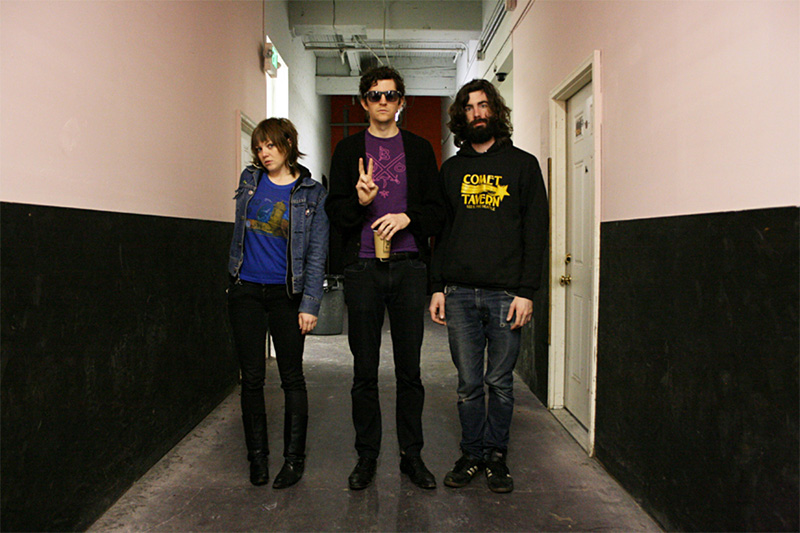Musicians walk offstage because of bad sound. Audiences love to complain about acoustics. Sound can make or break a club’s reputation, and the craftsmen who have perfected the art of delivering consistent quality are always in high demand.
On a chilly Saturday night in Georgetown, Jim Anderson, regarded as the best live sound engineer in Seattle, is twiddling knobs and furrowing his brow, his mouth slightly agape. “It always sounds better over there than it does where I have to stand,” he says, gesturing back to his mixing board by the door while standing in the middle of Slim’s Last Chance Chili Shack and taking in the warm pedal-steel guitar emanating from local band Low Land High.
The next night at the Sunset Tavern in Ballard, soundman Dave Abramson is staring intently at his board, gingerly gliding a finger over a fader knob, imperceptibly adjusting the cello accompanying Kaylee Cole‘s dark and delicate vocals. It’s a sparse setup, with Cole’s electric piano the third sonic component. After Cole, Portland-based performer Nick Jaina is joined by a half-dozen other musicians, including violin and horn players. The volume is naturally higher, but equally balanced.
Discussing his philosophy of mixing a room, Abramson feels that it’s easier to add than to subtract from the equation, regardless of the instrumentation at hand. “I just try and give [musicians] only what they ask for,” he explains between sets. “It’s not about flooding the mains. I ask a guitar player how much [amplification] he wants and try to give him exactly that. I try to use the minimum amount of gear an artist needs.”
A New Jersey native, Abramson has been doing sound around Seattle for the better part of a decade, running boards everywhere from the now-defunct Rainbow in the U District to Chop Suey on Capitol Hill; he currently works two days a week at the Sunset. “You can have great sound in small, crappy clubs and terrible sound in larger spaces; it’s all about mixing to the room,” he says emphatically.
As the house sound guy at Neumos, 25-year-old Evan LeSure now finds himself in an interesting new role on the other side of the mixing board. His freshly minted garage-punk band, Salmon Thrasher, has started making the rounds on the club circuit, and will play the Comet this coming Monday, Feb. 22. Their sound is angular, bright, and brash, reminiscent of the Wipers or the early works of Sebadoh, and built upon deceptively simple song structures.
“We’re not doing any Brian Eno stuff,” says guitarist/vocalist Justin Ripley, referring to the artful English composer.
“There’s no string quartet; it’s not very complicated,” agrees LeSure.
“Not yet!” interjects vivacious drummer Tara Sloan, a newbie to percussion who displays a precocious amount of swing and stamina for a player only 18 months into her craft. The trio are seated in the bowels of Neumos after LeSure has finished soundchecking temporary electronic hip-hop supergroup Head Like an Espresso Truck, and before Sloan plays a set at the Comet with her other band, What What Now.
Though they’ve been together less than six months and have played only a handful of shows, Salmon Thrasher exudes arresting potential, wrapping an impressive amount of atmospherics and expressiveness around their bare-bones compositions—no doubt because Ripley is also a sound engineer, regularly helming the boards at Showbox SoDo. “We’re both completely obsessed with tone,” affirms LeSure, a classically trained musician who also plays bass with dour folk-rock outfit See Me River.
Onstage, LeSure is a blur of hair and a wall of sound, coaxing dizzying textures out of his thick bass lines. “There are, like, 50 dudes in town trying to get exactly what his pedal setup is,” says Ripley, nodding at LeSure. “We have to give major credit to Greg Williamson, who builds the best distortion pedal ever.” (Williamson’s pedals, manufactured under the name Greedtone, have had a cult following among Seattle musicians since the early-’90s grunge era.)
The band has recently wrapped recording for their debut album, utilizing the live room at Neumos as their studio space. LeSure describes the band’s careful placement of Sloan’s drum kit to face a curtain hanging at the back of the stage. “The cool thing is that we know where the sweet spot is upstairs,” says Ripley, willfully descending into sound-guy geek-speak. “So we had a stereo mike hanging upstairs and had the compressor’s attack set…and the PA on.”
“They have their own secret sound words,” says Sloan, shaking her head and smiling. “They said ‘wiggly’ today.”
To which Ripley replies, “Wiggly is a technical term!”








